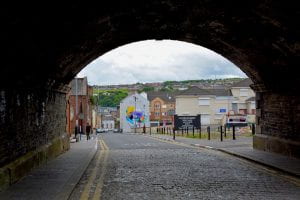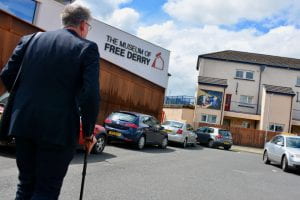Post by Anna Connole, Democracy Fellow, JMU ’21
As twenty one sets of feet shuffled down the streets of Derry, Northern Ireland, their ears were eagerly awaiting the stories they were promised. Derry was our second stop of three on a study abroad, led by JMU School of Communications Professors Carlos Aleman and Melissa Aleman, across Ireland that revolved around the communication, conflict and culture of the country. We met dozens of people, all gracious and kind enough to expose to us their painful pasts. All of us were humbled and admittedly overwhelmed by their intimate disclosures.
Each story was met with equal attention, but new perspectives on the conflict arose with each new person. It became very clear, very fast, that this conflict was not simply a civil war, a war for independence, or a battle between Christian denominations. There were hundreds of factors at play, and for each person, different parts stood out. For me, a self-proclaimed political and civic engagement cognoscente, it was the words of Jon McCourt that haunted me for the rest of the trip.
 McCourt, an avid peace advocate who works out of Derry, stood on the pavement where he once watched a good friend shot dead. It occurred on Bloody Sunday, a famous massacre that took place on January 30, 1972. He explained how the day began as a peaceful civil rights march that turned deadly when british soldiers opened fire on the unarmed crowd with live ammunition. Our guides often compared this Irish history to the experience that of the marchers in Selma, Alabama in 1965. Irish leaders were often heard citing Dr. Martin Luther King Jr. and other leaders of the American civil rights movement.
McCourt, an avid peace advocate who works out of Derry, stood on the pavement where he once watched a good friend shot dead. It occurred on Bloody Sunday, a famous massacre that took place on January 30, 1972. He explained how the day began as a peaceful civil rights march that turned deadly when british soldiers opened fire on the unarmed crowd with live ammunition. Our guides often compared this Irish history to the experience that of the marchers in Selma, Alabama in 1965. Irish leaders were often heard citing Dr. Martin Luther King Jr. and other leaders of the American civil rights movement.
There McCourt stood with infinite and intimate wisdom of this conflict. He emphasized that, for him, the most tragic thing was how avoidable the violence was. According to him, the decades of death wouldn’t have happened if it weren’t for the 14 murders of Bloody Sunday. It was a deadly mistake and a day that changed the whole tone of the tensions in Northern Ireland. McCourt repeated that the only reason those marchers were even out on the streets was to secure simple equality. He rooted the messy conflict into just three things: houses, jobs and the vote.
This hit me really hard; one of those tragic realizations when you open your eyes a little wider. That is, a lot of places face the same societal issues and the more you learn, the more things start to sound eerily familiar. The rights, justice and equality that is supposed to be accorded to all humans, that people so desperately fight for here in the U.S., are also being taken away somewhere else.
 For Northern Ireland in the 1960s, the inequality was rooted in religion. There was a minority Catholic population that felt discriminated against by the majorityProtestant population. Catholics were not being given fair housing or job access and often were forced to give away their vote to their landlords, who were protestant in the majority of cases. As a result, Catholics felt underrepresented politically and were living in unfair conditions. In addition, a much lengthier centuries-long complicated history with Britain, also fueled both sides’ respective desires about their relationship to the United Kingdom. Catholics typically wanted to be independent under a Republic of Ireland, while Protestants largely wanted to remain loyal and united to the crown. What ensued, was the Troubles, the time which marked a bloody war on the streets of Northern Ireland between a handful of powerful paramilitary armies, british soldiers and police. It generally is assigned to the years of 1969, with the Battle of the Bogside as the starting point, and ends with the signing of the Good Friday Agreement in 1998.
For Northern Ireland in the 1960s, the inequality was rooted in religion. There was a minority Catholic population that felt discriminated against by the majorityProtestant population. Catholics were not being given fair housing or job access and often were forced to give away their vote to their landlords, who were protestant in the majority of cases. As a result, Catholics felt underrepresented politically and were living in unfair conditions. In addition, a much lengthier centuries-long complicated history with Britain, also fueled both sides’ respective desires about their relationship to the United Kingdom. Catholics typically wanted to be independent under a Republic of Ireland, while Protestants largely wanted to remain loyal and united to the crown. What ensued, was the Troubles, the time which marked a bloody war on the streets of Northern Ireland between a handful of powerful paramilitary armies, british soldiers and police. It generally is assigned to the years of 1969, with the Battle of the Bogside as the starting point, and ends with the signing of the Good Friday Agreement in 1998.
It was when McCourt pointed out those three things that worlds collided in my head. The issues may not always manifest in the U.S. with religion, but the segregation of the two religions to this day in Derry can be compared to the struggles for racial and socio-economic integration in America. Addressing inequities in access to jobs, housing and voting rights are at the core of work in the field of civic engagement in America. The statement was another reminder of how much people shouldn’t take for granted having the ability to vote, own a house for a fair price or have an equal shot at a new job. Studying abroad, it was very clear how much someone working in civic engagement could learn from the experiences in Ireland.
Some of our interlocutors told us that during the Troubles’ era and when travelling abroad, people would express pity on them when they said they were from Northern Ireland. It was a war zone and they couldn’t imagine living in a place like that. Except, those in Northern Ireland also felt similarities to what was happening in other places, for example to the police brutality used on African Americans in the U.S., especially during the Civil Rights movement. They also saw and still see immigrants from places such as Sudan, who experience violence on the streets. Our interlocutors wanted to teach us how it is never wise to assume there is just one narrative to learn from a conflict.
Lessons from their history can inform the future.
The political fight of Brexit threatens every ounce of peace Northern Ireland currently has. The narrative and past of Ireland cannot be cast aside during Brexit negotiations, just as parts of U.S. history shouldn’t be forgotten when laws are being changed.
As we see protest after protest arising in the U.S., we can look to the similar pasts of Ireland and America and site the value in keeping violence out of it. I’ll cite the highly praised film, “Bloody Sunday” (Paul Greengrass, 2002), to express this. At the end of the film, 14 protestors lay dead at the hands of the government. Civil rights leader Ivan Cooper dedicated a whole campaign to convincing the masses that peace was the way to go and if they use peace, then they will prevail. Joining the IRA or other paramilitaries would just give them justification to use violence in return. After the violent day is over, he closes the film with these words, “I just want to say this to the British Government… You know what you’ve just done, don’t you? You’ve destroyed the civil rights movement, and you’ve given the IRA the biggest victory it will ever have. All over this city tonight, young men… boys will be joining the IRA, and you will reap a whirlwind.” History proved Ivan Cooper tragically correct in his predictions.
This sentiment is shared by Jon McCourt and many others still today. The government stepped on the people’s right to peacefully demand equal treatment under the law and it did nothing but bring more pain to everyone involved.
We can also observe the extreme value that is consistently placed on housing, jobs and the vote, by the people. Take these rights, these quasi-inalienable rights, away and people will demand change. When a government passes new laws, say for example a state law that bans job discrimination based on hair style, it is protecting equal access and opportunity to jobs.
History provides us many lessons, and it doesn’t have to be only U.S. history that we listen to.
Even when major fights have ended, it doesn’t mean the problem is solved. Gerrymandering still occurs in both the U.S. and Ireland after major waves to make voting rights more inclusive. Issues do not simply go away after solving just one section of the problem. When the highest court in the country votes to bar challenges to partisan gerrymandering, is it keeping its promise to provide equal access to voting for each of its citizens?
Lastly, another core part of civic engagement work is the pursuit of civil discourse and respectful conversation.
In Ireland, we heard from a former police officer, which would mean that people automatically label him as a protestant and loyalist to England, share how he was only able to find peace when he stopped putting the other side’s voice on mute. We saw a woman deal with the murder of her husband by creating personal friendships with the members of the paramility that killed him. These are living examples of how an open-mind and respect during conversation and debate can bring together even the most divided of ideologies. Talking through issues to find solutions and to empathize with the other can be the cure to poisonous and polarized politics. We saw it work and saw the importance of it first hand to the mental health of those who have been torn apart.
Being dedicated to the common good, or to be responsible participants in a representative democracy is not always a clear cut path. I certainly have a much greater appreciation for the open paths in my life to a more inclusive democracy and will pay close attention to any corner of the world where disenfranchisement and oppression are occuring. It may be across the pond, but it certainly isn’t too far from home either.

Recent Comments